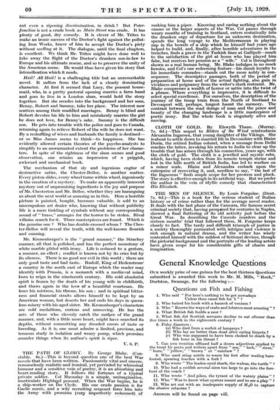THE PATH OF GLORY. By George Blake. (Con- stable. 6s.)—This
is beydnd question one of the best War novels that have been written. - Passionately vital and sincere, remorselessly realistic and ironical, yet pervaded by whimsical humour and a sensitive vein of poetry, it is an absorbing and heart-rending story. It follows the fortunes of a typical private soldier. Col Macaulay is a simple, unimaginative, inarticulate Highlakd peasant. When the War begins; he is a ship-worker on the Clyde. His one crude pagsion is for Gaelic music, and a wily recruiting sergeant lures him into the Army with promises (very imperfectly redeemed) of making him a piper. • Knowing and caring nothing about the causes or the larger aspects of the War, Col passes through weary months of training in Scotland, enters ecstatically into the drunken orgy of departure for an unknown destination, spends the long voyage to the Mediterranean in playing nap in the bowels of a ship which he himself had years ago helped to build, and, finally, after horrible adventures in the trenches, finds a grave in the Turkish lines at Gallipoli—much to the satisfaction of the girl at home who has played him false, but receives her pension as a " wife." Col is throughout shown as a real human being. Mr. Blake indulges in no mock heroics, and Col's one redeeming feature—his dumb loyalty to his immediate comrades—stands out the more nobly in con- sequence. The descriptive passages, both of the period of preparation at home and of the actual fighting, also gain in vividness and poignancy from the writer's stark restraint. Mr. Blake compresses a wealth of horror or satire into the twist of a phrase. Where everything is impressive, it is difficult to select special excellence. For ourselves, the description of the journey of the troop train from the North of Scotland to Devonport will, perhaps, longest haunt the memory. The contrast between the mad doings of man and the peace and beauty of the changing landscape is a little masterpiece of poetic irony. But the whole book is singularly alive and moving.
































 Previous page
Previous page